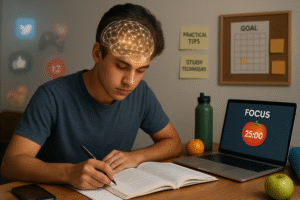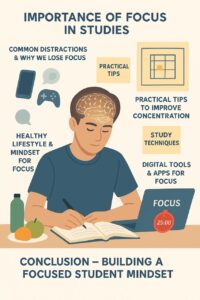How to Focus on Study – A Complete Guide for Students
📝 Introduction
How to Focus on Study
-
Why focus matters in study:
In today’s digital world, distractions are at an all-time high—smartphones, social media, and entertainment constantly compete with our academic goals then how-to-focus-on-study is a biggest question.-
Focus is not just about reading textbooks for hours; it is about quality learning, where our brain absorbs, retains, and applies knowledge effectively.
-
According to neuroscientists, the brain works best in deep concentration states (also called flow), which can be cultivated through proper techniques.
-
-
Purpose of this blog:
-
To provide students with a step-by-step guide on mastering concentration.
-
To explore scientific, psychological, and practical methods for improving study focus.
-
To analyze common barriers and how to overcome them.

-
📌 Outline Covered
-
Importance of Focus in Studies
-
Common Distractions & Why We Lose Focus
-
Scientific & Psychological Basis of Focus
-
Practical Tips to Improve Concentration
-
Study Techniques for Maximum Productivity
-
Healthy Lifestyle & Mindset for Focus
-
Digital Tools & Apps for Focus
-
Long-Term Discipline & Motivation
-
Conclusion – Building a Focused Student Mindset
1. Importance of Focus in Studies
-
Focus = Academic Success:
-
A distracted student spends hours studying but retains little.
-
A focused student can learn the same material in half the time.
-
Example: 2 hours of focused study = 5 hours of distracted study.
-
-
Benefits of sharp focus:
-
Higher retention & recall of concepts.
-
Better time management → more free time.
-
Stress reduction (no last-minute cramming).
-
Increased confidence in exams and competitive tests.
-
-
Diagram: The Study Focus Cycle
2. Common Distractions & Why We Lose Focus
(a) External Distractions
-
Noise (TV, conversations, traffic).
-
Smartphones (social media, messages, games).
-
Poor study environment (cluttered desk, uncomfortable chair).
(b) Internal Distractions
-
Wandering thoughts (future worries, daydreaming).
-
Stress and anxiety.
-
Lack of motivation or unclear goals.
-
Tiredness or lack of sleep.
(c) Biological Factors
-
Low energy due to poor diet.
-
Overexposure to blue light (phones) → poor sleep → low focus.
3. Scientific & Psychological Basis of Focus
-
Brain Function:
-
The prefrontal cortex controls focus, decision-making, and attention span.
-
Too many stimuli → cognitive overload → inability to concentrate.
-
-
Attention Span in Digital Age:
-
A Microsoft study (2019) found the average attention span dropped to 8 seconds (less than a goldfish).
-
Students now require intentional focus-building practices.
-
-
The Flow State (Mihaly Csikszentmihalyi):
-
Deep engagement where time “flies.”
-
Achieved when skill level = challenge level.
-
-
Pomodoro Effect (Francesco Cirillo, 1980s):
-
25 min study + 5 min break improves brain efficiency.
-
4. Practical Tips to Improve Concentration
(a) Create a Study-Friendly Environment
-
Quiet, well-lit, organized study desk.
-
Keep water and stationery nearby.
-
Remove clutter to reduce mental load.
(b) Digital Detox
-
Switch off notifications.
-
Use “Do Not Disturb” mode.
-
Keep phone away or use focus apps.
(c) Set Clear Goals
-
Daily goals (finish 2 chapters).
-
Weekly goals (prepare notes for 3 subjects).
-
SMART Goals (Specific, Measurable, Achievable, Relevant, Time-bound).
(d) Time Blocking
-
Allocate fixed slots:
-
Morning → toughest subjects.
-
Afternoon → revision.
-
Evening → practice tests.
-
(e) Reward Yourself
-
Small rewards after completing tasks (snacks, 10 min walk, favorite show).
5. Study Techniques for Maximum Productivity
(a) Pomodoro Technique
-
25 minutes study → 5 min break.
-
After 4 rounds, take a 15–20 min break.
(b) Active Recall
-
Instead of re-reading, test yourself.
-
Example: After a history chapter, close book & write key points from memory.
(c) Spaced Repetition
-
Review notes at intervals:
-
Day 1 → Day 2 → Day 7 → Day 15 → Day 30.
-
-
Boosts long-term retention.
(d) Mind Mapping
-
Visual diagrams linking topics.
-
Helps understand complex subjects easily.
(e) SQ3R Technique (Survey, Question, Read, Recite, Review)
-
Useful for reading-heavy subjects.
6. Healthy Lifestyle & Mindset for Focus
-
Sleep: 7–8 hours daily → brain consolidates memory.
-
Diet:
-
Brain foods → nuts, seeds, fish, leafy greens.
-
Avoid junk food & excess sugar.
-
-
Exercise:
-
30 mins daily improves oxygen flow to the brain.
-
-
Meditation & Mindfulness:
-
10 mins daily = sharper concentration.
-
-
Positive Affirmations:
-
Replace “I can’t do this” with “I will give my best.”
-
7. Digital Tools & Apps for Focus
-
Forest App → Grow a virtual tree by staying focused.
-
Cold Turkey → Blocks distracting websites.
-
Notion / Evernote → Organize study notes.
-
Quizlet → Flashcards for active recall.
- Aaoapdhein – For Online classes and Quick learnings
8. Long-Term Discipline & Motivation
-
Self-Discipline > Motivation:
-
Motivation fades; discipline ensures consistency.
-
-
Accountability Partner:
-
Study with a friend for accountability.
-
-
Progress Tracking:
-
Use a habit tracker or calendar.
-
-
Visualization:
-
Imagine exam success or career goals to stay motivated.
-
9. Conclusion – Building a Focused Student Mindset
-
Key Takeaway:
Focus is a skill, not a gift. It can be developed through structured environment, proper study techniques, healthy lifestyle, and disciplined habits. -
Final Motivation:
Remember, every distraction you overcome brings you one step closer to your dream career. Focus is not just about studying—it is about shaping your future.

